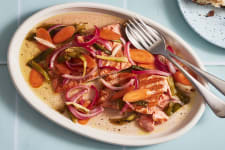
A Foolproof Method for Crispy Skin on Fish
August 3rd, 2020Perfecting the Nuance of Texture on Seafood
A pan-seared fillet of wild salmon with extra cripsy skin highlights everything we adore about cooking with good-quality seafood. It’s just as perfect on the deck of a fishing vessel as it is for an intimate, special occasion dinner, and it’s a meal that every home cook should know how to make.
To ace the sear for salmon with crispy skin, you need three essential things:
-
A hot pan
-
High-heat cooking oil
-
A fillet that has been patted dry
A well-seasoned cast iron pan or carbon steel pan is ideal for searing, but you can use stainless steel if that’s what you have. Avoid using a non-stick pan, as its coating actually inhibits a good sear.
You'll need to cook with a fat that has a high smoke point. Something like light olive oil or even ghee will get the salmon skin crispy without burning. Do NOT use extra-virgin olive oil or butter.
The final component of this recipe is properly prepped salmon. It’s essential to pat the fillets dry with an absorbent tea towel or paper towel. Any excess moisture on the fillet is going to cause the surface of the fish to steam rather than sear, and that wiill cause it to stick to the pan. Additionally, you can allow the fish to sit at room temperature for about 15 minutes after removing it from the refrigerator to help it cook more evenly.
For extra credit, score the skin with a very sharp knife. Scoring makes searing foolproof, as it helps the fillet lay more evenly along the bottom of your pan as it cooks. To do this, make shallow cuts through the skin, about ¼ inch into the fillet. Make these cuts anywhere between ¼ inch to ½ inch apart — the more, the crispier! Note: If you're having trouble scoring the fillet, skip this step. It's not an essential part of searing.
Pan-Seared Salmon with Crispy Skin
By Wild Alaskan Company
Prep time
5 minutes
Cook Time
7 minutes
Total time
12 minutes
Yield
2 servings
Ingredients
- 2 (6 oz.) portions sockeye or coho salmon
- Sea salt and freshly ground black pepper
- Lemon wedges, for serving
Instructions
1. Heat up a large skillet over medium- high heat, then add a small amount of oil (or ghee) to your pan — just enough to cover the bottom. When the oil begins to shimmer, season the salmon fillets with salt and pepper. With the skin side down, carefully begin to lower one fillet into the oil facing away from you (so that you don’t get splattered). If you hear sizzling when the fish makes contact with the pan, slide the rest of the fillet into the pan. If not, pull back and wait until the oil is hot enough to sizzle.
2. Immediately use a spatula to press down onto the fillet so that the skin makes solid, even contact with the surface of the pan and hold for about 15 seconds. Repeat this process for remaining fillets, then lower heat to medium.
3. Allow the salmon to cook, completely undisturbed, for 3 to 4 minutes until you can see the skin picking up golden tones around the edges. To determine if they’re ready to flip, try to slide a fish spatula between the pan and the fillet. The skin will release itself from the surface of the pan once it’s seared. If it’s sticking too much, wait another 30 to 60 seconds and try again.
4. Carefully flip the fillets so that they’re skin-side up in the pan and allow the salmon to just cook through. Thick fillets may need another minute or two, while thin tail pieces may need even less time to finish.
5. Serve immediately, with lemon wedges on the side so that the skin stays crispy through the meal.
Consuming raw or undercooked meats, poultry, seafood, shellfish, or eggs may increase your risk of food-borne illness, especially if you have a certain medical condition. The FDA recommends an internal temperature of 145°F for cooked fish.





